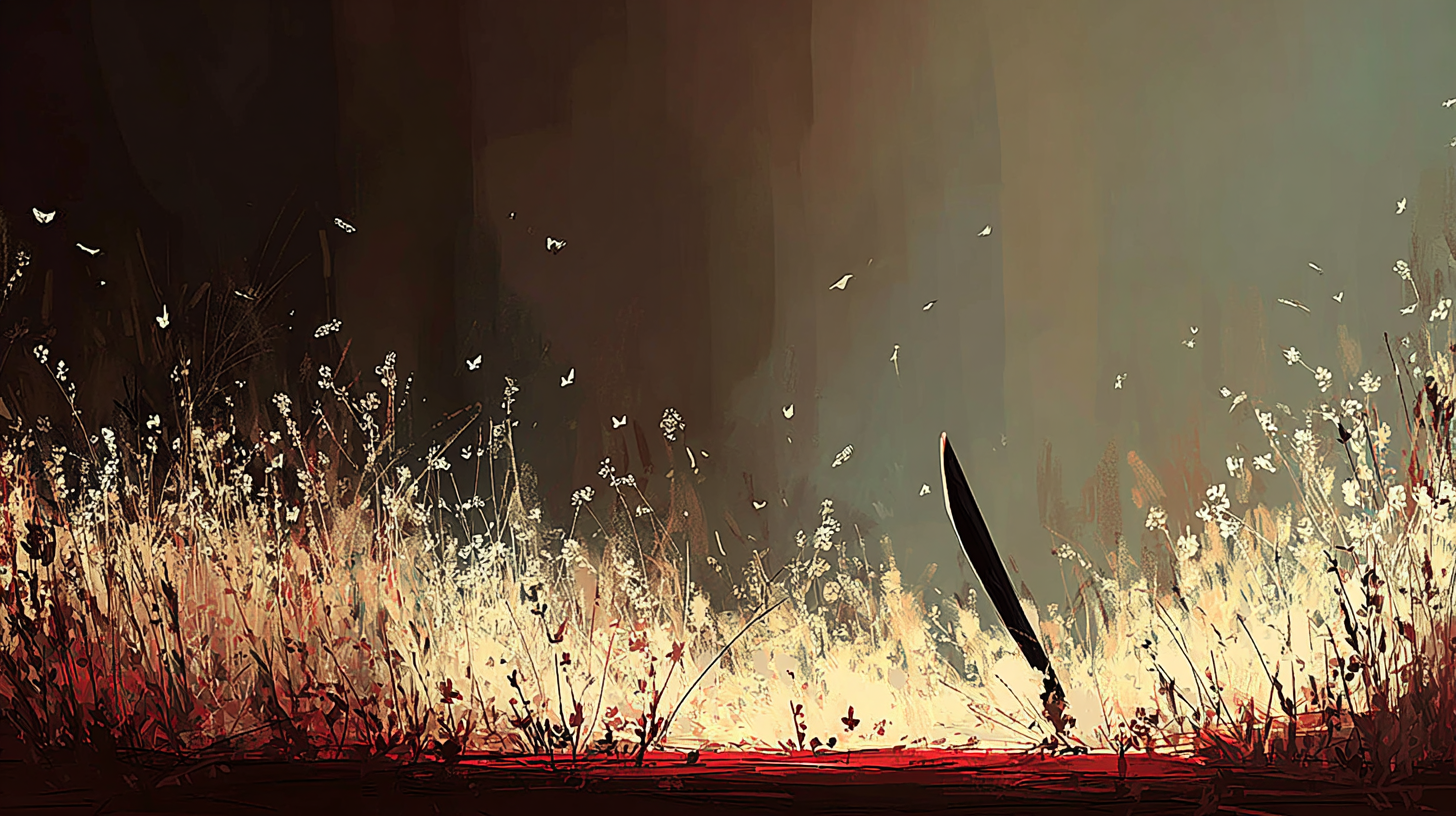Blade means the sharp part of a tool, a fan wing, or a thin leaf of grass.
blade は、ナイフなどの「切れる部分」や「プロペラの羽」、または「草の細い葉」を意味します。
以下は英単語 “blade” に関するストーリー型学習コンテンツです。まずは大枠の意味を理解して最後の文章で確認しましょう。
「blade」の主な意味(main meaning)
| 品詞 | 意味 | 発音記号 | 英語例文 |
|---|---|---|---|
| 名詞 | 刃、刃物の部分 | /bleɪd/ | The blade of the knife is very sharp. |
| 名詞 | プロペラなどの羽 | /bleɪd/ | The helicopter has four blades. |
| 名詞 | 草などの細長い葉 | /bleɪd/ | A single blade of grass grew between the rocks. |
「blade」の語源(etymology)
語源:古英語 blæd(葉、刃、刀身)
核イメージ:「薄くて長いもの」や「切れる部分」
→ 草の葉、剣の刃、プロペラの羽など「細長くて尖った形」に共通点あり。
「blade」の類義語(synonyms)
| 類義語 | 英語例文 |
|---|---|
| edge | The edge of the blade was dull. |
| knife | He used a sharp knife to cut the rope. |
| sword | The knight held his sword tightly. |
| fan | The fan stopped spinning when the power went out. |
| leaf | A green leaf floated on the water. |
「blade」の反義語(antonyms)
| 反義語 | 英語例文 |
|---|---|
| handle | Hold the knife by the handle, not the blade. |
| blunt part | The blunt part of the scissors is safe to touch. |
「blade」のコロケーション(collocations)
| コロケーション | 英語例文 |
|---|---|
| sharp blade | Be careful, it’s a very sharp blade. |
| blade of grass | A blade of grass tickled my foot. |
| fan blade | The fan blade broke during the storm. |
| steel blade | The steel blade can cut through metal. |
| blade length | The blade length is about 10 inches. |
「blade」の2項表現(binomials)
| 表現 | 英語例文 |
|---|---|
| blade and handle | Every knife has a blade and handle. |
| grass and blade | The field was full of grass and blades moving in the wind. |
英語ストーリー(english story)
Title: A Sharp Decision
One summer afternoon, Ken was helping his uncle at a gardening center. His job was to cut the overgrown grass and clean up the small yard behind the shop.
He picked up a tool with a sharp blade and started working. “Be careful with that,” his uncle warned. “The blade can cut more than just grass.”
Ken looked at the long blade of grass waving in the wind. As he swung the tool, the steel blade easily sliced through the grass. However, when he got close to the old fan lying on the ground, one of its fan blades got stuck in the tool.
The noise surprised Ken. “What happened?” his uncle asked.
“The blade hit something hard,” Ken replied, checking the blade length for damage.
His uncle picked up the broken fan blade and said, “This could have been dangerous. A blade is useful but only if you use it wisely.”
They sat down under a tree. A blade of grass brushed Ken’s hand. “It’s funny,” Ken said, “how the same word can mean so many things.”
His uncle smiled. “Yes, just like every tool has a blade and handle, every word has many sides.”
和訳
題名:鋭い決断
ある夏の午後、ケンはガーデニング店で叔父の手伝いをしていた。彼の仕事は、伸びすぎた草を刈って、店の裏庭をきれいにすることだった。
ケンは**鋭い刃(sharp blade)のついた道具を手に取り、作業を始めた。「それには気をつけろよ」と叔父が注意した。「その刃(blade)**は草だけじゃなく、他のものも切れるぞ。」
風に揺れる長い**草の葉(blade of grass)**を見ながら、ケンは道具を振るった。**鋼の刃(steel blade)は簡単に草を切り裂いた。しかし、地面に落ちていた古い扇風機に近づいたとき、1枚の扇風機の羽(fan blade)**が道具に引っかかった。
大きな音にケンは驚いた。「どうした?」と叔父が聞いた。
「何か硬いものに**刃(blade)**が当たりました」とケンは言い、**刃の長さ(blade length)**を確認した。
叔父は壊れた**扇風機の羽(fan blade)**を拾い、「危なかったな。**刃(blade)**は便利だが、賢く使わなきゃ意味がない」と言った。
2人は木の下で腰を下ろした。1本の**草の葉(blade of grass)**がケンの手に触れた。「同じ単語でいろんな意味があるなんて不思議だね」とケンが言った。
叔父は微笑みながら、「そうだな。道具に**刃と持ち手(blade and handle)**があるように、言葉にもいろんな面があるんだよ」と答えた。
「blade」のQ&A
- Qbladeとknifeの違いは何ですか?
- A
bladeは「刃」の部分そのものを指し、knifeは「ナイフ全体(刃+持ち手)」を意味します。
- Qedgeとbladeの違いは何ですか?
- A
edgeは「刃の先端部分(とがった部分)」を意味し、bladeは「刃全体」や「切れる部分の構造全体」を指します。
- Qfanとfan bladeの違いは?
- A
fanは「扇風機や送風機全体」、fan bladeはその中の「羽の部分」だけを指します。
- Qbladeとhandleはどうして反対語になるのですか?
- A
道具の構造として、bladeは「切る部分」、handleは「持つ部分」で、役割が正反対なため対になる概念です。
- Qblade of grassとは何ですか?
- A
blade of grassは「草の細長い1本の葉」を意味します。bladeはこの場合「細長い形」を表す表現です。
- Qsharp bladeとただのbladeの違いは?
- A
sharp bladeは「よく切れる刃」であり、「刃が鋭利である」ことを強調しています。bladeだけでは鋭さまでは含まれません。
- Qblade lengthはどういうときに使いますか?
- A
blade lengthは「刃の長さ」を表す言い方で、ナイフやハサミ、草刈り機などのサイズを説明するときに使います。
| 単語 | 日本語の意味 | 使い方の特徴 | ニュアンス | かんたんな例文(英語+訳) |
|---|---|---|---|---|
| blade | 刃・草の葉・羽根 | ナイフ・剣の刃、草の細長い葉、プロペラや扇風機の羽根などに使う | 「細長くて、平たく、切れる・動く」イメージ | The blade of the knife is very sharp.(そのナイフの刃はとても鋭い。) |
| edge | 端・ふち・刃先 | テーブルのふち、紙の端、ナイフの切れる部分など | 「先っぽ・境目」や「鋭さ」を表すこともある | Be careful near the edge of the cliff.(崖の端には気をつけて。) |
| leaf | 葉っぱ | 木や植物の広がった葉全般 | 植物の「一枚の葉」に使い、食べ物の葉などにも | A leaf fell from the tree.(葉が木から落ちた。) |
| wing | 翼・羽 | 鳥・飛行機・建物の一部など「広がったパーツ」に使う | 飛ぶための「大きなはね」のイメージ | The bird flapped its wings.(その鳥は羽をバタバタさせた。) |
ニュアンスまとめ
- blade:切る・動く・細長い形(ナイフ/草/羽根)に共通
- edge:物の一番外側、ふち(切れ目・先端)
- leaf:木・植物の葉っぱそのもの
- wing:鳥や飛行機の飛ぶための広いはね



コメント